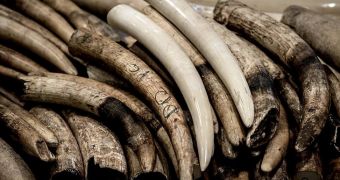This past Tuesday, the Environmental Investigation Agency and the Humane Society International released a new report saying that, presently, the world's largest online retailer of elephant ivory and whale products is a Japanese company by the name Rakuten.
The organizations say that, according to their investigations into the matter at hand, thousands of advertisements for ivory or whale meat are currently on display on this company's website.
More precisely, the Environmental Investigation Agency and the Humane Society International have recently counted over 28,000 advertisements for elephant ivory and over 1,200 for whale products.
In their report on this issue, the organizations detail that the Rakuten Group trades ivory and whale meat via a subsidiary dubbed Rakuten Ichiba (www.rakuten.co.jp) that it wholly owns.
The conservationists who worked on this investigation say that, as shocking as this may seem, some of the whale products advertised on Rakuten's website come from species that are protected by law.
This protection is ensured under the moratorium on commercial whaling established by the International Whaling Commission, and has been in place since 1986.
Besides, these marine mammals are supposed to also benefit from protection from the Convention on International Trade in Endangered Species of Wild Fauna and Flora, which prohibits international trade.
The Environmental Investigation Agency and the Humane Society International claim that, apart from the fact that they originate from endangered species, some of the whale products listed advertised on said website represent a threat to public health.
This is because they are contaminated with potentially dangerous amounts of mercury, maybe even other harmful compounds, the organizations maintain.
“Nine whale products were purchased from Rakuten Ichiba in 2013 and tested for mercury. Eight of these exceeded the Japanese national limit for total mercury concentration of 0.4 parts per million (ppm), with one sample of pilor whale meat having a shocking mercury concentration of 9.5 ppm, more than 20 times higher than the Japanese regulatory limit.”
“The average mercury level of the nine products was 4.2 ppm, more than 10 times higher than the regulatory limit,” the environmentalists write in their report.
As far as elephant ivory is concerned, the organizations say that, of the over 28,000 advertisements for items made of this material documented in this year's February, roughly 95% were for name seals that some people use to sign documents with their signatures engraved in the ivory. Others were for jewelry, musical instruments and chopsticks.
Needless to say, much of Japan's ivory trade is supported by poaching activities in Africa. Together with the Humane Society International, the Environment Investigation Agency argues that “By listing ivory products for sale, Rakuten Ichiba is helping to stimulate the market for ivory products in Japan and perpetuate illegal ivory flows and the poaching of elephants.”
In light of these findings, the organizations urge that Rakuten subsidiaries in the United States, the United Kingdom, Canada, France, Germany, Austria and several other parts of the world team up and demand that the company headquarters in Japan bans all advertisements for elephant ivory and whale products.
“The Environmental Investigation Agency (EIA) is calling on the Rakuten Group and its global affiliates and subsidiaries, including Rakuten Ichiba, to immediately enact a permanent ban on the sale of all elephant, whale and dolphin products,” the conservationists urge.

 14 DAY TRIAL //
14 DAY TRIAL //